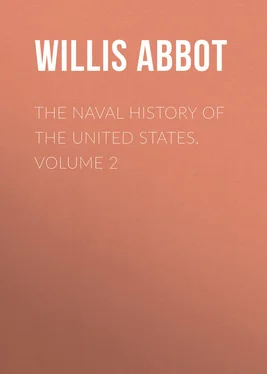Willis Abbot - The Naval History of the United States. Volume 2
Здесь есть возможность читать онлайн «Willis Abbot - The Naval History of the United States. Volume 2» — ознакомительный отрывок электронной книги совершенно бесплатно, а после прочтения отрывка купить полную версию. В некоторых случаях можно слушать аудио, скачать через торрент в формате fb2 и присутствует краткое содержание. Жанр: foreign_antique, foreign_prose, Историческая проза, на английском языке. Описание произведения, (предисловие) а так же отзывы посетителей доступны на портале библиотеки ЛибКат.
- Название:The Naval History of the United States. Volume 2
- Автор:
- Жанр:
- Год:неизвестен
- ISBN:нет данных
- Рейтинг книги:5 / 5. Голосов: 1
-
Избранное:Добавить в избранное
- Отзывы:
-
Ваша оценка:
- 100
- 1
- 2
- 3
- 4
- 5
The Naval History of the United States. Volume 2: краткое содержание, описание и аннотация
Предлагаем к чтению аннотацию, описание, краткое содержание или предисловие (зависит от того, что написал сам автор книги «The Naval History of the United States. Volume 2»). Если вы не нашли необходимую информацию о книге — напишите в комментариях, мы постараемся отыскать её.
The Naval History of the United States. Volume 2 — читать онлайн ознакомительный отрывок
Ниже представлен текст книги, разбитый по страницам. Система сохранения места последней прочитанной страницы, позволяет с удобством читать онлайн бесплатно книгу «The Naval History of the United States. Volume 2», без необходимости каждый раз заново искать на чём Вы остановились. Поставьте закладку, и сможете в любой момент перейти на страницу, на которой закончили чтение.
Интервал:
Закладка:
For the next two weeks all was quiet along the shores of the Patuxent and St. Leonard's Creek. The enemy had learned wisdom from their late defeat, and contented themselves with blockading the mouth of the creek, and leaving Barney undisturbed in his retreat. But the doughty commodore had no idea of being thus confined, and during the time of quiet made preparations for an attempt to break the blockade. Land forces from Washington were sent down to aid in this attempt; and two pieces of artillery were to be mounted on a hill at the mouth of the creek, and thence throw red-hot shot into the enemy's ships. The land forces, however, rendered not the slightest assistance; and a too cautious colonel posted the battery at such a point that no shot could reach the enemy without first passing through a hill. Accordingly, when Barney led his flotilla gallantly down to the attack, he found that the issue of the conflict rested upon the sailors alone. From the battery, which was expected to draw the enemy's fire, not a single effective shot was fired. The sailors fought nobly, using their heavy long twelves and eighteens with great effect. But they were sadly hampered by their position; for the mouth of the creek was so narrow that but eight barges could lie abreast, and the others coming down from above soon packed the little stream from shore to shore, giving the enemy a mark that the poorest gunner could hardly miss. Against the storm of grape and canister that the British poured upon them, the sailors had absolutely no protection. The barges were without bulwarks, and the blue-jackets at the guns and at the oars were exposed to the full force of the British fire. Yet in this exposed situation the gallant fellows kept up the fight for nearly an hour, only withdrawing when the last ray of hope for help from the shore battery had vanished. Shortly after the Americans abandoned the attack, the blockading squadron got under way and stood down the bay. From the way in which one of the frigates was working her pumps, the Americans saw that their fire had not been entirely without effect.
Barney's flotilla had now given the British so much trouble that they determined to destroy it without delay; and an expedition of more than five thousand men – composed of regulars, marines, and a few negroes – was carried up the Patuxent, and landed at Benedict, where an armed brig had been stationed to cover the disembarkation. It was early dawn when the signal to land was given, and the river was covered in an instant with a well-manned and warlike flotilla. It was hard work for the British sailors, for a strong current was running; but by three o'clock in the afternoon the whole army was landed, and encamped in a strong position on a hill overlooking the village. Though no American troops were anywhere in the vicinity, the landing was conducted with the utmost caution. As the prow of each boat grated on the sand, the soldiers leaped on the beach, and instantly drew up in line, ready to repel any attack. After the infantry was landed, about a hundred artillerymen followed, and the same number of sailors dragging howitzers.
It is easily understood that this powerful force was not organized solely to destroy Barney's pitiful little flotilla. The real purpose of the British commander was to press on into the interior, and capture Washington, which the Americans had foolishly left without any defences whatever. It came to Barney's ears that Admiral Cockburn had boasted that he would destroy the American flotilla, and dine in Washington the following Sunday. This news the American commodore sent off to the authorities at the capital, and they then began to make futile preparations to repel the invader. In the mean time the British commenced their march up the shores of the Patuxent, meeting with no opposition. Barney, knowing that the defence of the national capital was of far greater importance than the fate of his flotilla, landed with four hundred men, and hastened to the American lines before Washington. He left the barges under the command of the second lieutenant, Mr. Frazier, with instructions to set fire to every boat on the appearance of the enemy, and then join the commodore with all the men left under his charge. Accordingly, when the invading column reached Nottingham, Mr. Frazier took the flotilla still higher up the creek, – a move that vastly disconcerted the British, who saw their prey eluding them. "But in the main object of our pursuit we were disappointed," wrote a British officer. "The flotilla which had been stationed opposite to Nottingham retired, on our approach, higher up the stream; and we were consequently in the situation of a huntsman who sees his hounds at fault, and has every reason to apprehend that his game will escape." But the game never fell into the hands of the ardent hunters; for the next day Mr. Frazier fulfilled his orders by setting fire to every barge, and, after seeing several of the larger boats blow up, mustered his men, and cut across the country, to join his superior officer. The British naval forces soon after reached Pig Point, the scene of this destruction, and there remained; while the land forces immediately turned away from the river, and marched upon Washington.
It is not necessary to give in detail the incidents of the series of skirmishes by which the British fought their way to the American capital. They were opposed by raw militia, and the few sailors and marines under Barney. The former fled with promptitude at the very first fire, but the sailors and marines fought gallantly. The fighting was sharpest at Bladensburg; and here Barney's blue-jackets won praise from everybody, even from the enemy whose advance they disputed. Barney himself led the Americans, and sighted a favorite gun of the sailors' battery, until he fell desperately wounded. This battery commanded the road by which the main column of British advanced; and by its hail of grape and canister it beat back the advancing regiments, and for some time checked their further progress. The British thereupon opened with rockets, and sent out sharp-shooters to pick off the Yankee gunners. One of these riflemen was observed by the Americans to deliberately build for himself a small redoubt of stones from an old wall; and, lying down behind it, he began a deliberate fire upon the Americans. His first bullet went through the cap of one of the sailors, and the second sent a poor fellow to his long account. The marines answered with their muskets; but the fellow's stone rampart saved him, and he continued his fire. Barney vowed to put an end to that affair, and, carefully sighting one of his cannon, pulled the lanyard. The heavy round shot was seen to strike the sharp-shooter's defence, and stones and man disappeared in a cloud of dust. Meantime, the enemy had thrown out flanking parties under cover of the woods, and had nearly surrounded the little band of sailors. A musket-ball struck Barney in the thigh, and he began to grow faint with loss of blood; and, finding that the militia had fled, and the sailors were becoming exhausted, the commodore ordered a retreat. The blue-jackets left the field in good order; but their gallant commander had gone but a few steps, when the pain of his wound forced him to lie down under a tree, and await the coming of the enemy. The British soon came up, led by Gen. Ross and Capt. Wainwright of the navy. After learning Barney's rank, and courteously offering to secure surgical aid, the general turned to his companion, and, speaking of the stubborn resistance made by the battery, said, "I told you it was the flotilla men." – "Yes. You were right, though I could not believe you," was the response. "They have given us the only fighting we have had."
Meanwhile, the British, having routed the Americans at every point, pressed on to Washington. The inhabitants fled before them, and the town was almost deserted when the British marched in with banners flying and bands playing. The enemy held the city for only a day; but in that time they did such deeds of vandalism, that even the people and the press of London cried out in indignation. The President's house, the Capitol, all the public buildings except the Patent Office, were burned to the ground. The navy-yard, with the uncompleted ships on the stocks, was likewise burned; but in this the enemy only acted in accordance with the rules of war. It was their destruction of the public buildings, the national archives, and the Congressional library, that aroused the wrathful indignation of all fair-minded people, whether Americans or Europeans. "Willingly," said one London newspaper, "would we throw a veil of oblivion over our transactions at Washington. The Cossacks spared Paris, but we spared not the capital of America." A second English journal fitly denounced the proceedings as "a return to the times of barbarism."
Читать дальшеИнтервал:
Закладка:
Похожие книги на «The Naval History of the United States. Volume 2»
Представляем Вашему вниманию похожие книги на «The Naval History of the United States. Volume 2» списком для выбора. Мы отобрали схожую по названию и смыслу литературу в надежде предоставить читателям больше вариантов отыскать новые, интересные, ещё непрочитанные произведения.
Обсуждение, отзывы о книге «The Naval History of the United States. Volume 2» и просто собственные мнения читателей. Оставьте ваши комментарии, напишите, что Вы думаете о произведении, его смысле или главных героях. Укажите что конкретно понравилось, а что нет, и почему Вы так считаете.











![Hubert Bancroft - The Native Races [of the Pacific states], Volume 5, Primitive History](/books/749157/hubert-bancroft-the-native-races-of-the-pacific-s-thumb.webp)
![Hubert Bancroft - The Native Races [of the Pacific states], Volume 1, Wild Tribes](/books/750126/hubert-bancroft-the-native-races-of-the-pacific-s-thumb.webp)